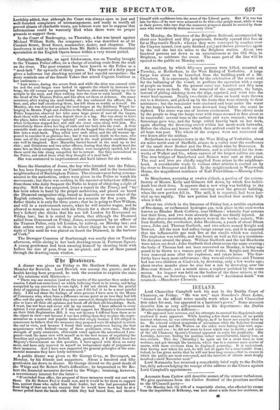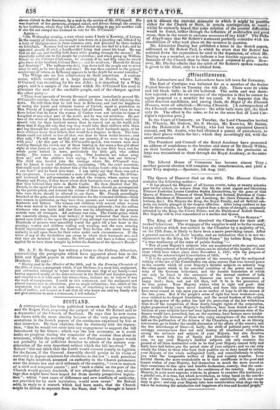IRELAND.
Lord Chancellor Campbell took his seat in the Dublin Court of Chancery, on Friday. "He was not," says Saunders's News Letter, "dressed in the official robes usually worn when a Lord Chancellor first takes his seat, but appeared in a barrister's gown." Some accounts describe him as very self-possessed in his deportment : the Dublin Monitor's description is different-
" He appeared very nervous, and his attempts to conceal his disquietude only rendered it more apparent. While hearing a few short causes, of no public interest whatever, he was extremely fidgety, as if he knew not exactly what to do. He evinced evident symptoms of uneasiness while the Solicitor-General on the one hand and Mr. Warren on the other were baiting him with argu- ments pro and con. : he did not seem to know which way to decide ; and some of the old Chancery Queen's Counsel appeared to enjoy his perplexity. His Lordship, however, finding his position rather uncomfortable, hastily rose, at two o'clock. This day [ Saturday] he again sat for a short time, to hear motions, and got through the business, which was in a manner mere matter of course, with more evenness than he displayed yesterday. It is understood, that having now taken his seat, he will not sit again for a considerable time; indeed, he has given notice that he will not hear long causes—that is, causes in which the public are most concerned, and the interests of clients most deeply involved—until November next."
Lord Normanby has returned a remarkably brief reply to the Dublin bar, drily acknowledging the receipt of the address to the Crown against Lord Campbell's appointment.
Accounts from Carlow still describe scenes of the utmost turbulence. We give specimens from the Carlow Sentinel of the practices ascribed to the O'Connell party-
" On Monday last, the wife of a respectable elector, who effected his escape from the inquisition at Kilkenny, was met about a mile from her residence, at eleven o'clock in the forenoon, by a mob in the service of Mr. O'Connell he was deprived of her garments, stripped naked, and driven through the country to her residence, where they left her, after threateaing to pay her another visit if she did not compel her husband to vote for Mr. O'Cdnnell."
Again— "On Wednesday evening, a man whose name i learn is-Itearney, of Lorum, in the county of Carlow, was brought into town oh a jaunting-car, folloi-ed by a body of bludgeon-men in three common cars, and preceded by three leaders on horseback. Kearney had no coat or waistcoat on, nor had he a hat ; and he appeared greatly ill-tried, a handkerchief being tied round his head. Ile was tied on the car, and forcibly held down while passing through the streets I He repeatedly called out to the people for protection; and when going up William Street to the Citizens Club-room, be shouted, if he had fifty votes he would give them to his landlord, Colonel Bruen ; and he cried out, Hurrah for Bruen and Sunbury! ' The ruffians who held him down told the people not to mind what he said, as be was drunk and mad ! He was then escorted to the general rendexvomi of voters, as tilkeniit appears to be the depot for several counties." The Whig. are no less cnininatory in their assertions. A curiousscene, which occurred at a large meeting in Borris, where Mr.
O'Connell was recruiting for his sou John : it is dekeribed by a Whig paper, and is a sample of the means which Mr. O'Connell has used to stimulate the zeal of the excitable people, and of the charges against the other party-
" There were upwards of twenty thousand persons immediately around Mi. O'Connell's carriage, from whence he addressed them in a field adjoining the town. He told them that he had been in Kilkenny, and had the happiness of seeing the heroic and virtuous women of Carlow, equal in patriotism to Mrs. Prnnty of Longford, of whom they had all heard. He said when he was there before that he knew the women of Carlow were not inferior to those of Longford or any other part of the world, and he was not mistaken. fle saw two of the wives of Bruen's freeholders, who, when their husbands said they should vote for their landlord sooner than be turned out on the world, told them that if they did vote that way they Would take their children with them and beg through the world, and never see or know their husbands again, of let their children know their fathers that would be a disgrace to them. The hus- bands could not afford to lose all that was dear to them under heaven ; and they said, We will vote for God and our country, if we were to beg along with you.' (At this part of Mr. O'Connell's speech, two women were seen rushing through the crowd, one of them bearing in her arms a fine girl about eight or nine years of age, and the other followed by two little boys, and the whole party bathed in tears, particularly the little girl, who sobbed loudly. The women were crying out, Our husbands are taken away from us!' and the children were crying, We have lost our fathers!' The child was handed into the carriage where Mr. O'Connell was; and he kissed it most affectionately, exclaiming, Oh, the cruel monsters, that could rend asunder the dearest ties of the human heart—this is more than I can bear!' and he burst into tears. I can safely say that there was not a dry, eye present. I never witnessed a more affecting sight. When Mr. O'Con- nell recovered his self-possession, he asked the women, whose names were Murphy and Fenny, if they knew where their husbands were ; and they replied that they believed they were in Barris Castle. He then directed that Mr. French, as the agent of his son and Mr. Ashton Yates, should go, accompanied by the parish-priest, and demand the release of these men, or that their wives, who were there, should be allowed to see them. Mr. French accordingly knocked at the gate, and demanded admission for the wives and children—these two women in particular, as they were then present, and wanted to see their hisbands and fathers. The women and children, with several other women Who were moved to tears by the scene, were crying piteously ; but the callous Cerberus who was inside said that there was no admittance, as the persons outside were all strangers. Al! entreaty was vain. The Castle-gates, which are massively strong, were kept locked; it being intimated that there were armed men inside to fire upon thepeople if any attempt was made to free them. Hundreds of persons were assembled round the gates till a late hour in the evening; women and children wailing and weeping, and the men uttering horrid imprecations against the heartless Tory faction who could have the audacity to call upon them for their votes under such circumstances. If the wives of any of the freeholders can swear to where their husbands are, and that they are detained in custody, Mr. O'Connell will have a habeas corpus applied for to have them brought up before the Justices of the Queen's Bench."
Mr. A. F. St. George has written a letter to the Galway Advertiser, contradicting the paragraphs which have appeared about him in the Irish and English papers in reference to the alleged murder of Mr. Heathers. He says- " Having read in the Monitor of the 29th, and in the Evening Chronicle of the 28th of June, a paragraph which, if not libellous, is a most foul, malignant, and unfounded attempt to injure my character and 'Ott of my family—and having appeared nearly at the same moment in the Dublin' and London papers, and coupled as it is with some late transactions, inclines me to believe it was the work of conspirators. I could to this statement, and the malignant and absurd reports now in circulation, give an ample refutation ; but, afraid of the imputation that might be cast upon me, of interfering in any way with the ends of justice, and assured as I am that all who know me and my family will riot give credence to such a statement, 1 will refrain."



























 Previous page
Previous page